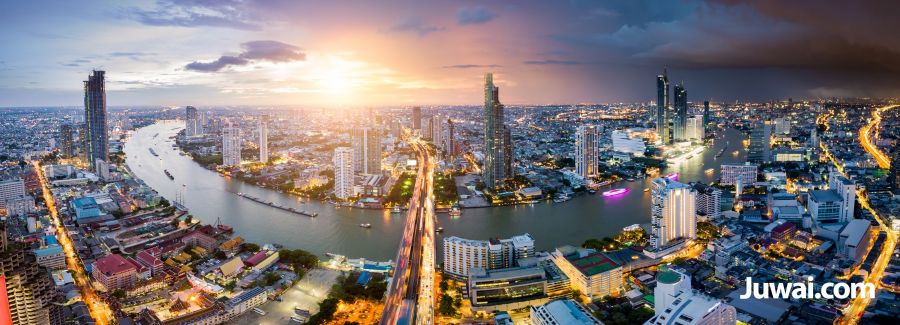You've successfully copied this link.
Thailand real estate all set to attract investors with long-term view

The property market in Thailand, in general, is on a downward slide due to the ongoing global pandemic.
However, the situation will not last forever. According to analysts, now is a good time for foreign property buyers to invest in one of the most promising markets in Southeast Asia. We explore some of the reasons why Thailand will continue to attract cross-border property investors, especially those with a long-term view.
Success in containing spread of Coronavirus
While other countries have dithered, Thailand’s response to Covid-19 has been swift, sharp and effective. Closing its borders early at the onset of the pandemic and implementing a State of Emergency thereafter, it has managed to contain the spread of the virus. As of July 9, Thailand has recorded just 3,202 cases and 58 deaths, and has not had a locally transmitted case for nearly a month.1
Although flights from many countries have yet to resume, many foreign buyers are looking for a hideout to escape a turbulent environment back home.
Jools Lamb, an Australian art consultant, just put down a deposit for a 600-square-feet apartment in the Ekamai district in Bangkok. She bought the place after being stranded in Thailand when the country closed its borders after the pandemic was declared.
“I come to Thailand very often for my work and have considered purchasing a place here before. The pandemic just helped me made up my mind. I was impressed by how the government handled the virus crisis and how ordinary Thai citizens comply with social distancing, wearing of masks and sanitising their hands without fuss unlike other countries. I feel very safe here. Plus, I got the apartment at a good price as business was so slow.”
Health Minister Anutin Charnvirakul in a Facebook interview with the South China Morning Post, declared, “We have shown to the world that this is the safest place for people to live, invest and travel.”
Thailand currently ranks as the best-placed country to have recovered from COVID-19 in Asia and ranks second among 184 countries recovering successfully from COVID-19 worldwide. The rankings were conducted on June 11 by PEMADU Associates in cooperation with the Ministry of Science and Innovation (MOSTI) of Malaysia and the Sunway group, which used data analysis to find out how well each country had responded to the COVID-19 pandemic.2
On July 1, Thailand lifted its near-total ban on foreign travellers to kick-start its stalled economy. The initial phase of opening the country’s borders will see Hong Kong, Singapore, South Korea and Japan passport holders with direct ties to Thailand – such as those with businesses, major investments or family in the country- allowed in. People from some Chinese provinces will also be given clearance.
Bargains abound
 After years of relentless project launches and a hectic construction frenzy, the market has now suddenly slowed to a crawl, thanks in part to the coronavirus. A correction is, however, underway. This has seen jittery developers taking a more realistic view on the sales price of their properties and willing to accept lower profits or throwing in enhancements such as free furniture packages, flexible payment terms or discounts for upfront cash purchases.
After years of relentless project launches and a hectic construction frenzy, the market has now suddenly slowed to a crawl, thanks in part to the coronavirus. A correction is, however, underway. This has seen jittery developers taking a more realistic view on the sales price of their properties and willing to accept lower profits or throwing in enhancements such as free furniture packages, flexible payment terms or discounts for upfront cash purchases.
Additionally, many landlords who owned apartments and holiday homes for tourists in Thailand are finding it difficult to maintain their properties. This has resulted in many pulling out of the real estate market, even at the cost of potential losses. Private sellers, who have ridden the rise in value of the baht during the past decade, are also willing to offer bigger discounts to ensure their property sells quickly.
As a result, discounts are available on anything from unsold developer stock, off-plan resale contracts to second-hand condos. Amazing deals are now suddenly available for investors willing to move fast and take risks, especially those with a long-term view or who intend to live in Thailand.
China Factor
 Chinese tourists are now the biggest demographic group to visit Thailand every year since 2011. The boom of Chinese tourists visiting and exploring Thailand, has inevitably led many to prospect and consider investing in the country’s real estate especially in Bangkok and coastal cities such as Pattaya and Phuket.
Chinese tourists are now the biggest demographic group to visit Thailand every year since 2011. The boom of Chinese tourists visiting and exploring Thailand, has inevitably led many to prospect and consider investing in the country’s real estate especially in Bangkok and coastal cities such as Pattaya and Phuket.
A general trend has shown that many Chinese buyers are seeking to invest closer to home rather than in Europe and the US. Thai real estate offers relative affordability especially when compared to the sky-high prices of China’s first tier cities such as Beijing, Shanghai and Guangzhou. Buyers also find Thailand’s good healthcare standards, excellent universities and comprehensive property ownership laws for foreigners, appealing. For those who plan to retire abroad, Thailand is one of their favourite destinations.
Georg Chmiel, the executive chairman of property portal Juwai IQI, said Chinese buyers are still very active online and still have great demand for Thai property. “We expect a surge in transactions later in the year, after the coronavirus outbreak settles down. Buyers who were held back by travel restrictions and other coronavirus-related challenges will finally make their purchases, and it will feel like they are all doing so at once. Over the longer time frame, Thailand should remain a popular destination for Chinese buyers – most likely one of the top two destinations in the world by number of enquiries in 2021 and 2022.”
Opportunity on the horizon
Many industry experts believe the Thai real estate will pick up as early as late summer, or more conservatively by the fourth quarter. Others predict a surge in activity later this year, suggesting the market is resilient enough to rebound as it is not hindered by high debt levels and there are reserves available.3 Prices are also expected to drop once business resumes. Thailand’s weakening currency presents an opportunity for foreign investors who will get more for their money than they would have done a year ago.
According to Juwai IQI’s first “Residential Property Index – Thailand” survey, the prospect of real estate in Thailand post-pandemic is promising, if as predicted, the economy picks up.
Sources: 1. Worldmeters – Coronavirus; 2: The Pattaya News: Thailand ranks second in the world in recovery from Covid19; 3. PR.com: Teflon Thailand: Where There's Crisis There's Opportunity
Liked this article? Sign up for free to get Juwai Juwai Asia Market updates!
2025 © Juwai. All Rights Reserved Privacy Policy | Terms of Service


